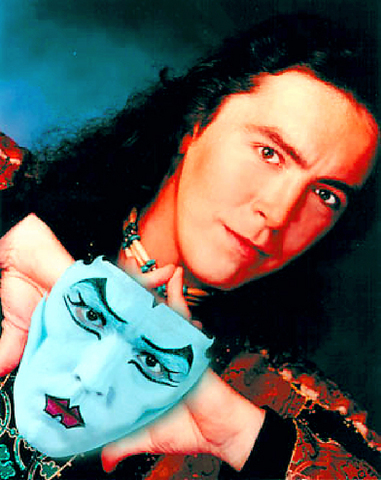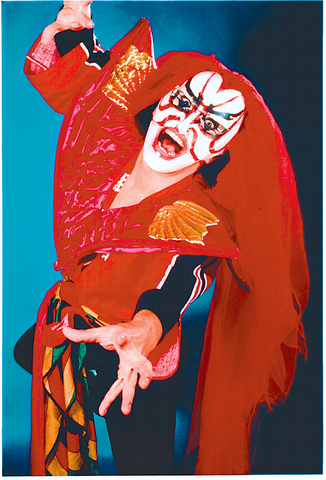This year's Christmas will not just be about Santa Claus and his consumer-ism-oriented gifts. For those who are looking for a little showmanship to spice up festivities, there is a magic show this weekend.
Frequently hailed as the magicians' magician, Jeff McBride from the US will bring his theater of illusion to Kaohsiung and Taipei to spread the joy of contemporary wizardry.
Born in 1960, McBride is recognized as a great innovator of contemporary magic having garnered countless awards and titles. His performances are not only the most sought-after magic shows in grand casinos but he is also in regular demand at art festivals around the world.

McBride has made it his life's work to study magic and to perfect his illusions.
When walking into one of McBride's magic shows, audience members are greeted with a theatrical performance that combines dance, drumming, Kabuki theater, martial arts and pantomime. McBride's shows are much more than mere eye-catching displays of magic tricks.
Having spent more than 20 years traveling Asia, India and other regions, McBride has learned his craft from different masters and has created his own signature fusion of drama, myth and magic to reflect the different cultural roots of the ancient art form.

McBride practices kendo, aikido and aerobic exercises so his shows are energetic. The sometimes intense performances are accompanied by comedic interludes in which the audience enjoys McBride's whimsical battle with the mysterious forces on the stage.
The innovative magic routines feature McBride's signature mask act in which exotic masks mysteriously appear, disappear, float in the air and change colors to dazzle the audience. In "Floating on Air," the great illusionist conjures up supernatural forces with his magic fan to lift Kabuki dancers high off the ground.
McBride, an official Guinness World Record holder, will demonstrate his sleight of hand skills in the "Kings of Cards" illusion, which is a trick that involves sophisticated deception -- the cards appear to flow out of his fingertips and spin from hand to hand.

In the "Sorcerer's Apprentice" illusion the magician teaches a selected member of the audience the simple steps necessary to apparently conjure up a phantom. It's an interactive act that breaks the secrecy of magic which is jealously guarded by a privileged few.
For McBride, magic is more than tricks such as pulling a rabbit out of a hat. Rather, it is the extension of imagination and all the human senses.
As the magician himself puts it: "You will only experience as much magic in life as you allow yourself to believe in. Whether you live in a world of facts and answers or a world of mystery and wonder, reality is a matter of your perception."
Endorsed by the local magicians circle which views McBride as the god of magic, tickets for his five shows are fast selling out.
Performance notes
What: McBride - Magic in Concert
Where: Zhide Hall at Kaohsiung Chiang Kai-shek Culture Center (高雄中正文化中心至德堂), 67, Wufu 1st Rd, Kaohsiung (高雄市五福一路67號); Taipei City Government Auditorium (台北市政府大禮堂), 1, Shifu Rd, Taipei (台北市市府路1號).
When: Tonight at 8pm in Kaohsiung; tomorrow at 7:30pm and Sunday at10:30am, 2:30pm and 7:30pm in Taipei.
Tickets: NT$500 to NT$1,800 for Kaohsiung; NT$500 to NT$2,000 for Taipei, available though ERA ticketing outlets.

In the March 9 edition of the Taipei Times a piece by Ninon Godefroy ran with the headine “The quiet, gentle rhythm of Taiwan.” It started with the line “Taiwan is a small, humble place. There is no Eiffel Tower, no pyramids — no singular attraction that draws the world’s attention.” I laughed out loud at that. This was out of no disrespect for the author or the piece, which made some interesting analogies and good points about how both Din Tai Fung’s and Taiwan Semiconductor Manufacturing Co’s (TSMC, 台積電) meticulous attention to detail and quality are not quite up to

April 21 to April 27 Hsieh Er’s (謝娥) political fortunes were rising fast after she got out of jail and joined the Chinese Nationalist Party (KMT) in December 1945. Not only did she hold key positions in various committees, she was elected the only woman on the Taipei City Council and headed to Nanjing in 1946 as the sole Taiwanese female representative to the National Constituent Assembly. With the support of first lady Soong May-ling (宋美齡), she started the Taipei Women’s Association and Taiwan Provincial Women’s Association, where she

Chinese Nationalist Party (KMT) Chairman Eric Chu (朱立倫) hatched a bold plan to charge forward and seize the initiative when he held a protest in front of the Taipei City Prosecutors’ Office. Though risky, because illegal, its success would help tackle at least six problems facing both himself and the KMT. What he did not see coming was Taipei Mayor Chiang Wan-an (將萬安) tripping him up out of the gate. In spite of Chu being the most consequential and successful KMT chairman since the early 2010s — arguably saving the party from financial ruin and restoring its electoral viability —

It is one of the more remarkable facts of Taiwan history that it was never occupied or claimed by any of the numerous kingdoms of southern China — Han or otherwise — that lay just across the water from it. None of their brilliant ministers ever discovered that Taiwan was a “core interest” of the state whose annexation was “inevitable.” As Paul Kua notes in an excellent monograph laying out how the Portuguese gave Taiwan the name “Formosa,” the first Europeans to express an interest in occupying Taiwan were the Spanish. Tonio Andrade in his seminal work, How Taiwan Became Chinese,